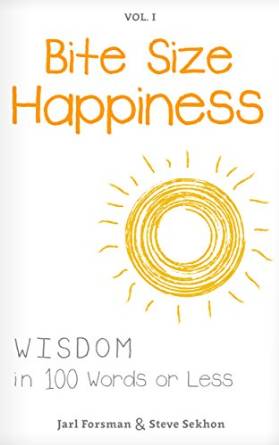The benefits of being the ‘witness’ can’t really be explained or understood intellectually. That’s because thinking about it just makes it another mental object to identify with or attain. Grappling with it mentally won’t help you have the actual experience, but it will give you an idea about what it means. Witnessing helps you understand how vast you are. When you’re completely present and allowing, you understand that what you actually are is the awareness in which…
Everything happens.
Jarl and Steve



Maybe you associate an intellectual process as something resistant. I noticed the expression “grapping with it mentally”, which sounds like quite an unpleasant struggle. I think one of the beauties of our brains is that we can (an must) use our brains to get “out of our heads”, which I consider the entire lexicon we have constructed about how things “should be.” I think there is no room at all for our ego in an intellectual process, and I think it is ego we are trying to step away from.
OK — I will let this go now. I just felt a strange dissonance in vocabulary.
Hello Jarl and Steve,
I think humans have varying ideas about how to visualize something, like being a witness. In order for me to be grateful and non-resistant, I have to visualize what that means, just as I have to visualize what I sense in a good life in order to habituate manifesting it. It seems to me we have to use our imaginations in order to get outside ourselves, and what could be more intellectual than imagining a positive truth to replace a previously imagined negative truth? It seems to me that only by imagining something can we actively construct a dream. I also think that the idea of understanding being something intellectual is a strange idea. As I write this, it occurs to me that maybe we just have somewhat opposite ideas about what “intellectual” means. Does the word connote something phony or insincere to you?
When I was studying music years ago, I found I had to imagine the expressive medium I wished to create, so that my practice would remove barriers between my efforts and my listeners. I find the same phenomenon in physics and cosmology, which have become horrendously “intellectual” as we are forced to part with all the comforts of our established intuition about what feels comfortable.
I don’t know how we can achieve anything for ourselves without imagining, to find the state within ourselves, or to access the one mind. I suspect I just don’t have an idea of what you mean by “understood intellectually”. Surely somehow or other we can use our brains to help us step outside our bad habits, rather than waiting around being at the mercy of serendipity.
Love, Larry
Hi Larry,
It’s true that the brain is a necessary and wonderful tool that facilitates our growth, creativity and ability to manifest. We are certainly not opposed to visualization, imagination, even planning. We are not against intellectual development, inquiry, exploration or even conversation. But the mind can also be like quick sand. While it is only one aspect of ourselves, albeit an extremely important one, we can become lost in the intellect. We can unintentionally reduce the entire world into the version of it we deal with between our own two ears. What we are advocating in this post is experiencing a particular state of being. The short cut to having this experience is by practicing simply being the witness without going into mental conniptions. We’re suggesting not making up a story about the witness, but rather trying to experience it directly. Our use of the word intellectual (not imagination) is a suggestion to refrain from adding thinking to the experience rather than subtracting it. Of course the mind creates great stuff. But true, deep joy is the ground of being beneath the story, in spacious, pure awareness or emptiness of a quiet mind. And the mind is, of course, FULL of story.
Love Steve